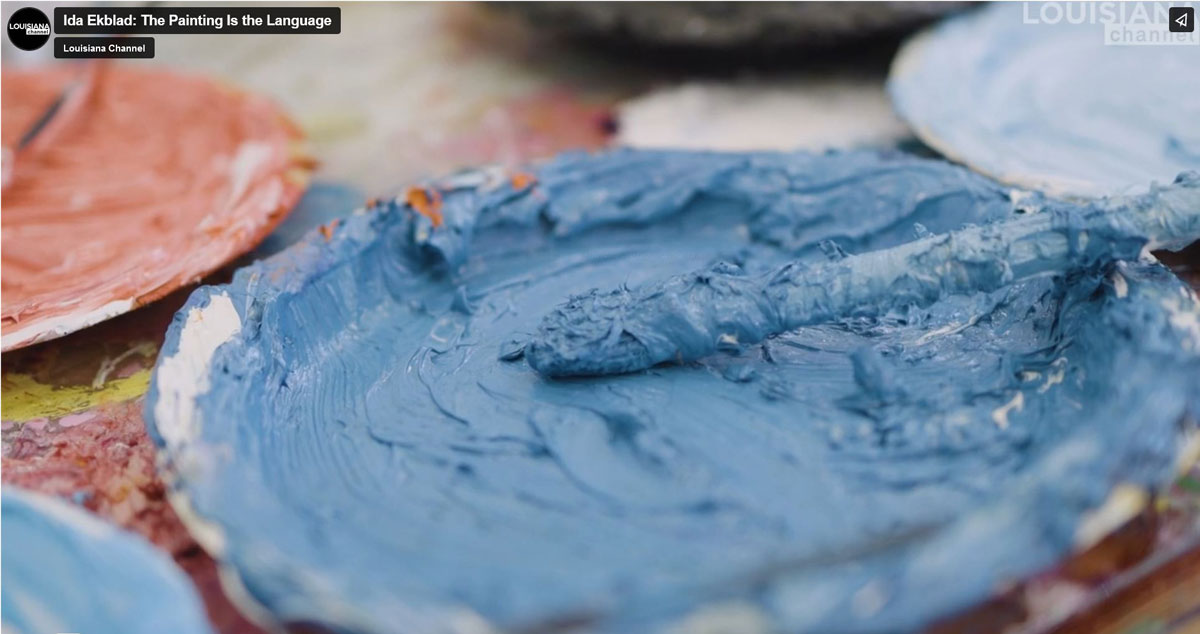VIDEO: Ida Ekblad-The Painting Is the Language
 Visit artist Ida Ekblad in her vibrant studio outside of Oslo, Norway, where she shares her thoughts on why she never runs out of ideas, her use of material and why failing is essential to her practice. When asked about how an artwork takes shape, Ida Ekblad says: “Very often, it’s using the materials the wrong way. It’s partly like a mad professor. You roam around and almost feel like you’re in kindergarten,” she says and continues: “It’s trial and testing. And failing and failing better, as Beckett would say.” In her studio, Ekblad is surrounded by colour from floor to ceiling. She finds inspiration both inside and outside of the studio: “I look at the negative space. Everything I see is processed in the same way that I process when I’m in the studio. So, the negative space between branches and leaves becomes a stroke,” she says and elaborates: “It’s almost like I’m finding my own paintings out in the world.”
Visit artist Ida Ekblad in her vibrant studio outside of Oslo, Norway, where she shares her thoughts on why she never runs out of ideas, her use of material and why failing is essential to her practice. When asked about how an artwork takes shape, Ida Ekblad says: “Very often, it’s using the materials the wrong way. It’s partly like a mad professor. You roam around and almost feel like you’re in kindergarten,” she says and continues: “It’s trial and testing. And failing and failing better, as Beckett would say.” In her studio, Ekblad is surrounded by colour from floor to ceiling. She finds inspiration both inside and outside of the studio: “I look at the negative space. Everything I see is processed in the same way that I process when I’m in the studio. So, the negative space between branches and leaves becomes a stroke,” she says and elaborates: “It’s almost like I’m finding my own paintings out in the world.”
“Ideas come very easily to me. And it doesn’t have to be a good idea. I do stupid stuff all the time. And sometimes the stupid idea gets interesting to me because it’s like a sore that itches.” To Ida Ekblad, the pieces can get somewhat embarrassing, but herein lies the nerve of her practice. It’s about finding the balance between the embarrassing and “the interesting and good”, as she phrases it. Ekblad uses the same shapes repeatedly in both her paintings and sculpture. For example, the shape of an anime character’s fringe or handwoven lace often appears in her work: “I like the shape as an abstract shape.” Ekblad also experiments with different materials: “I came across something called ‘puff medium’, which is a medium that you mix with these plastisol textile inks.” When heated, the ink grows “almost like a mushroom”, thus creating a whole new surface for the paintings. Ida Ekblad also uses a tremendous amount of oil paint in some works: “I’m almost sculpting the painting, which I like. The paint is so heavy that you really have to push it in with force.”
“It’s always hard talking about a painting because the language in itself is the painting,” Ida Ekblad says and continues: “To add more language to the painting is something that I’m very reluctant to do.” Still, she tries to explain: “It’s this thing of testing, testing, testing. But also the history of testing, so when you’ve tested so much and failed so much, you become an expert in your own work.” However, being an expert in one’s work is not the goal for Ida Ekblad. Quite the contrary: “I don’t want things to be too easy. If I have everything planned, I lose interest completely.”
Ida Ekblad (b. 1980) is a contemporary Norwegian artist working with various mediums such as painting, sculpture, performance, filmmaking, and poetry. Both pop-cultural and sub-cultural themes inspire her work. Ida Ekblad’s oeuvre is influence by Odilon Redon, Paula Modersohn Becker, Paul Thek, Edvard Munch, Florine Stettheimer, and Helen Frankenthaler. A genre-crossing approach signifies her style by incorporating aesthetics of graffiti, manga culture, old master paintings and meme culture. She is educated at the Oslo National Academy of the Arts (2007) and the Mountain School of Arts, Los Angeles, USA (2008). She participated in the Venice Biennale (2011, 2017), as well as in numerous solo and group exhibitions, including Kunstnernes Hus, Oslo; Kunsthalle Zürich, Zurich, Switzerland; Louisiana Museum of Modern Art, Humlebæk, Denmark; Museo Rufino Tamayo, Mexico City, Mexico; Kunstverein Braunschweig, Braunschweig, Germany (2018); Kunsthaus Hamburg, Hamburg, Germany (2017); National Museum of Art, Design and Architecture, Oslo, Norway (2013); Bergen Kunsthall, Bergen, Norway (2010); Bonniers Konsthall, Stockholm, Sweden (2010).
Ida Ekblad was interviewed by Roxanne Bagheshirin Lærkesen in her studio in Oslo, Norway, in October 2022, Camera: Rasmus Quistgaard, Produced and edited by: Roxanne Bagheshirin Lærkesen, © Louisiana Channel, Louisiana Museum of Modern Art, 2022. Louisiana Channel is supported by Den A.P. Møllerske Støttefond, Ny Carlsbergfondet, C.L. Davids Fond og Samling, and Fritz Hansen
